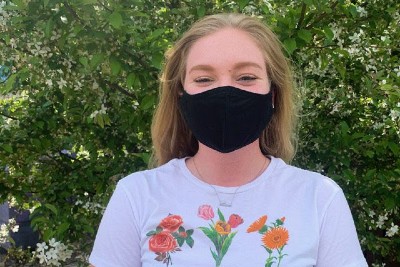
Plastics have invaded most of our world today, but oftentimes you cannot even see them. Virginia Tech senior and fish conservation major Gwyneth Martin is studying these often unseen microplastics and their frequency in freshwater fish as part of the Fralin Life Sciences Institute’s Fralin Undergraduate Research Fellowship (FURF).
Martin researches how microplastic ingestion affects freshwater fish right in the heart of Blacksburg. Except, analyzing fish stomachs was not always a part of Martin’s plan.
“I actually came into Virginia Tech as an undecided major and then chose meteorology,” Martin said. “Then, I went on a study abroad to study climate change impacts in the Dominican Republic and decided to change my mind and change my major.”
Martin still minors in meteorology and is even vice president of the Meteorology Club at Virginia Tech, but her focus has shifted to her research with Leandro Castello, an associate professor in the Department of Fish and Wildlife Conservation within the College of Natural Resources and Environment.
“With my lab, we do a little bit of everything, but all of our research is united by the fact that we try to improve the state of affairs with fisheries,” said Castello, an affiliated faculty member with the Fralin Life Sciences Institute and the Global Change Center at Virginia Tech. “So, this project with Gwyneth is another development of that line of thinking.”
Through Castello’s encouragement, Martin originally applied to Fralin’s Summer Undergraduate Research Fellowship (SURF) program but had those plans disrupted by the COVID-19 pandemic. FURF provided an alternative for her research going into her senior year.
“Dr. Castello knew about it and was thinking that it was going to be a good match just because we already had a basis for the research,” Martin said. “So, now we could actually expand our research through this program.”
The Fralin FURF program is an award program for Virginia Tech undergraduates from any discipline with a focus on increasing diversity in research. FURF provides students with an award of $1,000 to conduct research with a Virginia Tech faculty mentor for one year.
Before FURF, Martin had conducted a trial run with Castello to literally “test the waters” and see if there was a problem. Turns out, there was, and they decided to dig deeper.
Now, the study looks at five different species of freshwater fish swimming in Tom’s Creek and Stroubles Creek in Blacksburg. The goal is to find out what is happening to the fish and how the microplastics impact them based on their body size, trophic level, and species.
“If you look at the literature, by far most of the studies today have been focused on marine environments and very few in freshwater,” Castello said. “And even in those two environments, we know very little. So, Gwyneth’s main working hypothesis is to understand whether fish that feed on different components of the food web have different amounts of plastic in their guts.”
Microplastics vary in type and source, but all are degraded pieces of plastic less than five millimeters in length. Fish either purposefully eat the particles or indirectly ingest them through their normal daily behavior.
Not much is known about how microplastics affect fish at the population level, but large quantities of the material can cause serious damage to individual digestive tracts and growth rates. Such large quantities are exactly what Martin and Castello found.
“I think the fish that had the most microplastics had about 650 pieces,” Martin said. “Our first study didn’t even prepare us for that number. We thought that they were going to be more in the 50 to 100 range, which granted a few of them were.”
Martin presented her microplastic research at the Dennis Dean Undergraduate Research and Creative Scholarship Conference on April 30 to wrap up her time with FURF and end what was a research journey littered with obstacles.
“COVID-19 really messed things up for our research in several ways that just seemed like it would never end,” Castello said. “I couldn’t have had anyone better than Gwyneth because she always stood by and worked with me to make the project happen. She just went ahead with it on her own, which to me is really inspiring to see.”
Going forward, Martin says she feels more prepared through her research experience and the trials she faced, but she said her faculty mentor helped her the most.
“He has challenged me from day one and helped me to just realize how much of a commitment research is but also how rewarding it can be,” Martin said. “It was through him that I even found this program.”
Martin has nothing concrete planned for post-graduation but does plan to attend graduate school within the next five years to study climate change impacts and policy. Her immediate plan is to work in environmental policy.
Story by Tyler Harris










